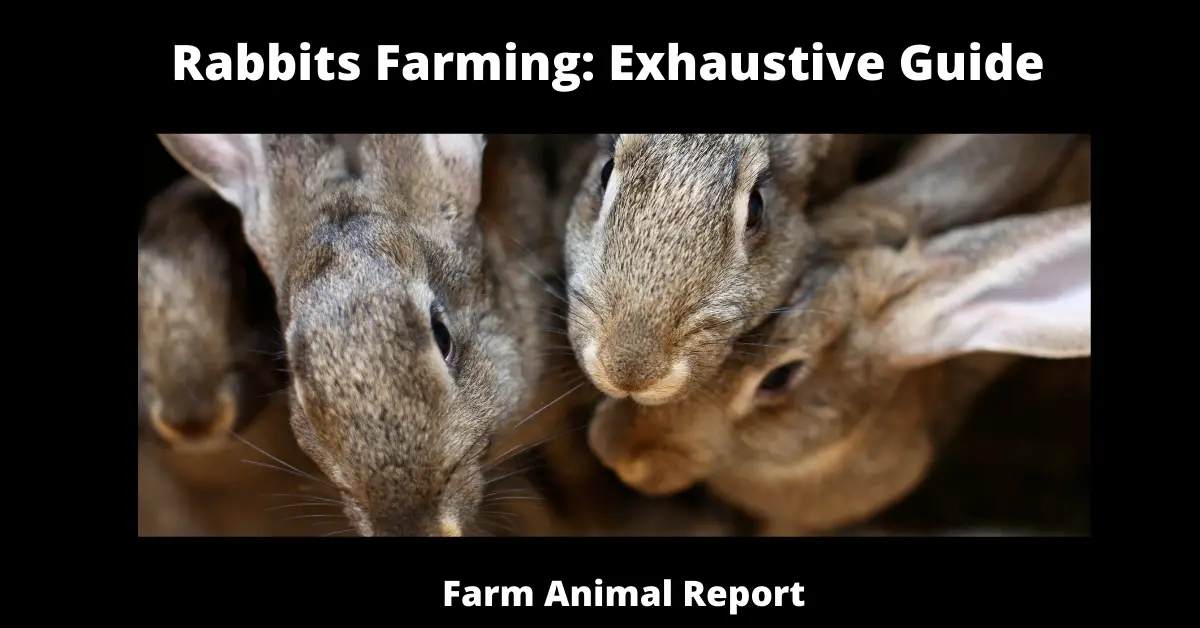Rabbits Farming: Exhaustive Guide
As a general rule Rabbit farming is generally known as cuniculture. It is a low-cost farming strategy that also employs alternative breeding procedures. In addition, Rabbits are very family-friendly animals, which is a unique aspect of their personality. Raising rabbits as pets or raising them for meat are both viable business ventures. People, on the other hand, are raising them as a successful business on a modest scale.
How do you Start a Rabbit Farm? Or How do you Start a Bunny Farm?
You can begin breeding rabbits by acquiring a single pair of mature breeder rabbits as a starting point. After then, you must ensure that they are well taken care of. It is not difficult because they are less demanding of treatment. They will give birth at the age of six months if all goes according to plan. Twice a year is sufficient. Each time they give birth, they will produce 6-8 kits. So, after a whole year, you’ve essentially amassed a bunny army of your own.
What is the Proper way to Handle a Rabbit?
Rabbits Farming – Rabbits are highly delicate micro-livestock, and they should be handled with care according to their age and size. This is why it is critical to follow a standard method when catching and handling them. Performing this procedure will help to guarantee that you do not injure any of the small vessels or cartilage in the ear or around the nape of the neck. Slowly approaching the Rabbit while conversing with it will prevent the bunny from being afraid, ensuring that none of those areas are injured. Reach out one of your hands and position it under the belly and chest region of the body. Raise the bunny by placing the second hand behind it and lifting it.
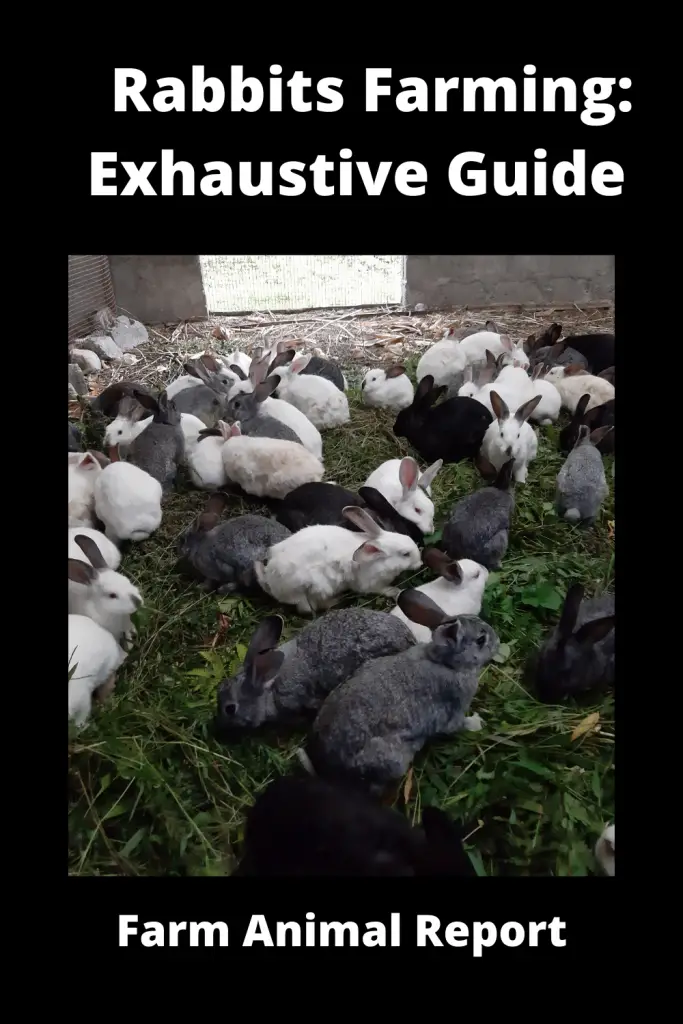
Rabbit Farming Overview
The Rabbit is in high demand as a lovely pet and a source of cholesterol-free meat due to its adorable appearance. You will not be required to provide more attention, food, or housing for rabbit rearing. For example, you can give them with our typical food that is readily available in our home, such as a combination of veggies and fruit, among other things.
For the time being, if we think about locations, it is necessary to have a little space available in every home.
Generally speaking, the rabbit farming industry is related with three key segments, including:
- Pet business – They are exceptionally adorable and in high demand as a home pet.
- Meat business – The rabbit meat industry generates higher-quality protein and minerals than poultry and beef.
- Maure business – Their manure is also in high demand.
How do I Start a Rabbit Business?
You can start a rabbit business by following under given guidelines
Beginners Guide to Start Raising Rabbits
To run a prosperous farm business, you must adhere to specific rules and regulations because you need to create a straightforward and straightforward starting approach toraise rabbits . In this section, we have attempted to outline a step-by-step process for rearing rabbits from the ground up. Design a faultless method to ensure the production of healthy rabbits as well.
What do you need to know to be a Successful Entrepreneur Rabbit Farmer?
Choose a breed and select a suitable location for it to live. Then educate yourself on the process of caring for it. Learn about their natural way of behaving and their eating process, mainly using the under-given knowledge.
Furthermore, to ensure earnings in your business, understand their reproductive cycle and growth strategies for speedy expansion.
Before taking any action, a rabbit farmer should be aware of the following:
- Their behavior – This is critical to strengthen care.
- Shelter – Make arrangements for rabbit housing before you begin raising rabbits.
- Feeding process.
- Care, setup, and maintenance
- Diseases and the steps one take to avoid them
- The breeding and mating process.
To help you comprehend these six steps more clearly, we’d like to share our knowledge and advice with you in this guide. Let’s get this party started.
Rabbits’ Behavioral Patterns
On a farm, you must ensure that the environment is safe and healthy. Otherwise, the process of growth will be slowed. In addition, they may be less productive in their work environment. Even if you keep them as a pet, you must become familiar with their habits.
General information
- Rabbits are believed to have originated in Europe and Africa.
- An adult rabbit can grow to be up to 40 cm in length.
- When it reaches adulthood, it typically weighs 1.2–1.4 kg.
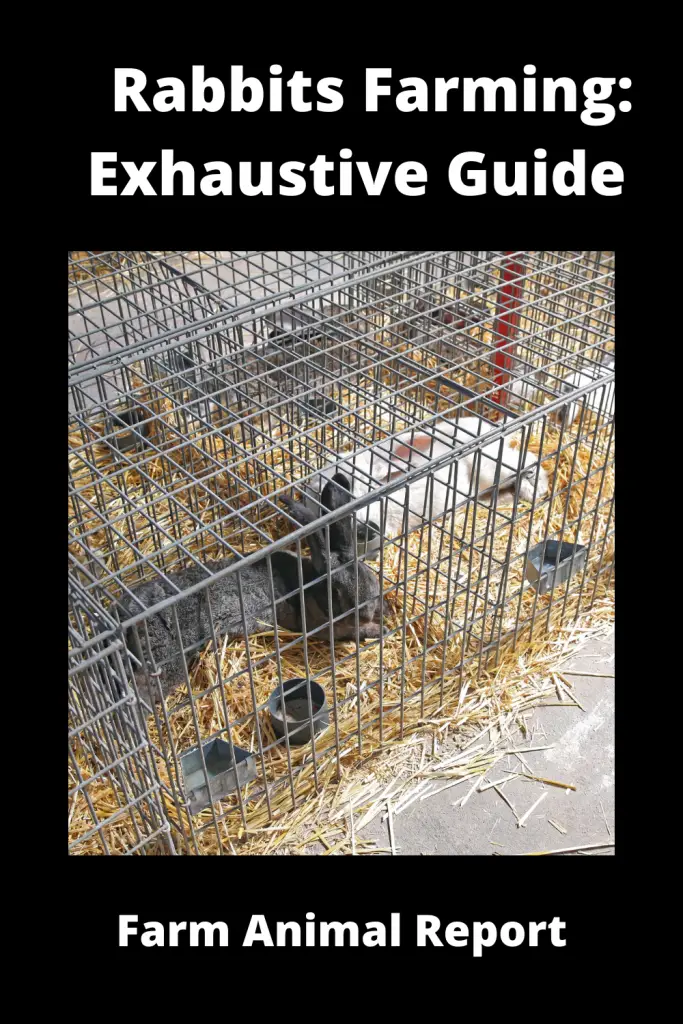
Rabbit Habitat
You can raise them virtually anywhere. It enjoys the quiet surroundings because it is the ideal home. They do not fare well in the hottest climates on the planet. They are, however, most comfortable in their own home, where they can sit beneath a tree or in the shade and avoid heat exhaustion or hypothermia.
Common Behavioral Patterns
Some qualities are shared by all of them, regardless of their manner:
- They are very gregarious creatures who like gentle companionship with others.
- They are incredibly cunning and dexterous.
Body Language
Most of the time, they are silent pets who communicate with subtle body language. The response of a rabbit can vary depending on its age, personality, and previous experiences. Rabbits who are scared or in pain, on the other hand, are more likely to exhibit behaviors such as aggressiveness or hiding.
- Maturity: Around 15-23 weeks.
- Gestation: Normally, one month.
- Life span: 8-12 years.
- Daily Water Intake: On average, 120ml+.
These animals, on the other hand, are frequently misunderstood. Because of their natural reactivity to loud noises and sudden movements, people see them as being fearful. Maximum bunnies are known for their aggressive temperament, which is a survival trait.
Size of the Rabbit Cage and Care Instructions
Cage selection is a critical component in Rabbit Farming operations. Females have been accustomed to being kept in cages.
- The required minimum cage space size is 1.1 meters (12 sqft), the recommended height is 2-3 meters (depending on the Rabbit’s height), and the recommended minimum play or movement space size is 9.7 meters (32 sqft).
- However, an ideal cage for Rabbit farming, whether commercially or as a hobby, can be made 36 inches wide, 30 inches deep, and 16 inches tall, which is excellent for growing all varieties of Rabbits.
But,
Other sizes may also be appropriate. The most critical aspect, however, is to ensure that there is sufficient space for movement. There are also other variables to take into account, such as:
- Multiple compartments: A rabbit requires a large hutch or cage, preferably with two chambers, to keep him or her happy and healthy.
- Materials for the cage: The cage must be constructed of steel and wood. If you build a cage out of wood, it will be more effective even if the dimensions are the same as before.
- Playing Area: If you are growing them for commercial purposes, you must consider a minimum quantity of run/exercise space for each plant (able to take three hops). This is critical in ensuring the health of the animals.
Rabbit Cage Maintenance
This is significant since good housekeeping is an essential predictor of financial success. It will help to minimize disease while also promoting overall health.
Here are a few pointers:
- Always make sure that the water and grain containers are clean.
- Additionally, keep the hatch in a sunny location where it will receive an avalanche of fresh air.
- Provide a Nest Box throughout the breeding season.
- Additionally, to prevent infections from spreading, cages should be cleaned once a month with one cup of chlorine bleach combined with one gallon of water.
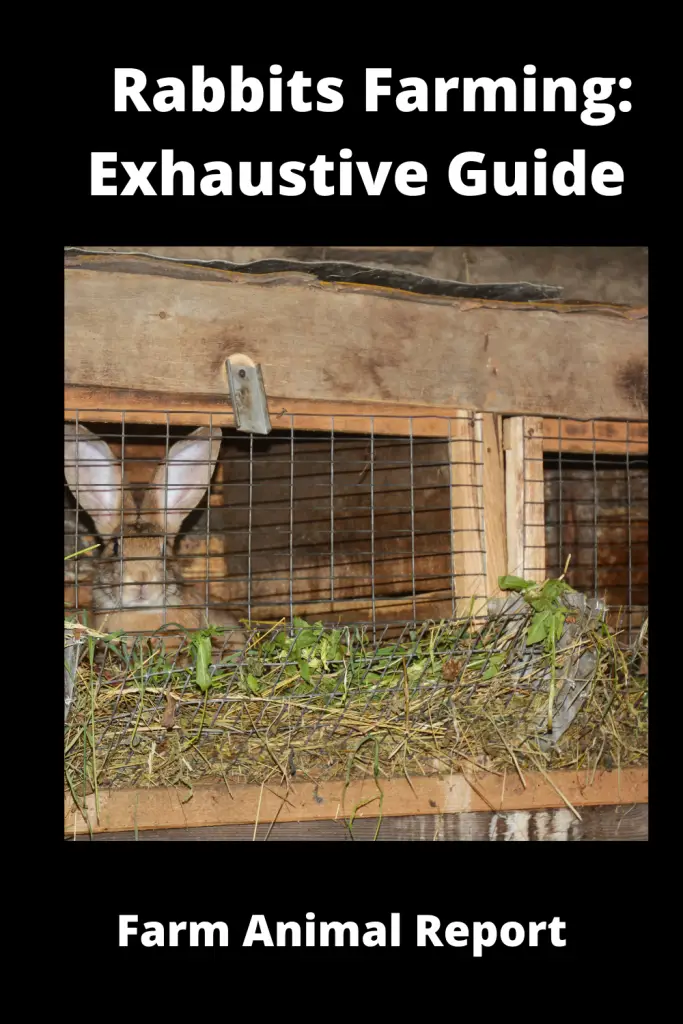
Rabbit Care Tips
The care process differs depending on the stage of development and maturity of the patient. However, the overall and daily care systems are differentiated according to the two seasons. However, we should exercise caution and take precautions to avoid inconveniences, particularly during the two seasons.
Rabbits Care in Summer:
It would help if you took the required precautions to maintain your Rabbit’s health in the summer.
- Trim long hair.
- Use stone in a rabbit cage.
- Now, If a possible Ice bag is placed into the cage for a specific time.
- And provide adequate freshwater.
Rabbits Care in Winter Season:
Rabbits are not tolerant of extreme cold; therefore, you must provide them with a warm and pleasant environment throughout the winter months. Here are some suggestions from rabbit farming professionals. Additionally, if you incorporated a few recommendations that are quite beneficial for all Rabbit, it would be greatly appreciated.
• Wrap your Rabbit in a jute bag or a heated carpet.
• Make sure they have enough food to keep them warm.
• Make every effort to keep the nest as clean and dry as possible.
• Additionally, expose them to direct sunlight once a day.
• If at all feasible, install a light above the cage or hitter.
· As well as maintaining a drinking temperature, freshwater should be available.
Foods and Feeding Tips
The following are the ideal things to consume to maintain a healthy diet:
Hay, green grass, veggies, fruits, and pellets are examples of what is available (minimum 18 percent fiber). Bread, avocado, chocolate, biscuits, potatoes, and rice, on the other hand, should not be included in the feed.
Average daily feeding ratio for adults
1. The grass and hay should be available 24 hours a day, seven days a week, and the ratio should be 70-80 percent.
2. Fresh vegetables and herbs (broccoli, lettuce, turnips, tomato, carrots, radish tops, beet greens, cucumber leaves, wheatgrass, and so on) account for 10-15 percent of the total calories.
3. Healthy Treat – 5%.
4. Dry food (mixed feeds, pellets) accounts for 5-10% of total calories.
Breeding Cycle
A female Rabbit reaches sexual maturity in 3 to 4 months after conception. Females are accustomed to being in a cage; however, males are a bit different. Generally speaking, males should be housed in separate cages. Do not breed a male rabbit in a female cage because it is too risky. Remember that female rabbits should be kept in a separate male cage until the breeding process is complete. After you have completed this task, you should separate. Pregnancy has been detected within 13 days of conception.
Rabbits go through a breeding cycle that is as follows:
The modern feeding technique of Rabbits using organic approaches is shown here in detail.
The food selection process varies depending on the percentage of calories they consume each day. According to their ages and breed types, for example, an adult Rabbit (6 months) might be described as
It is necessary to supply a variety of foods at that age, such as vegetables such as spinach and carrots as well as cucumber and green leaf because such foods have the potential to include significant substances such as-
- Protein
- Fiber
- Minerals
- Calories
- Crude
- Metabolic Energy
Keep in mind that if you are raising chickens for commercial purposes, you can use some food that can be obtained at the poultry food shop. Additionally, that cuisine contains a variety of nutrients and can be used as a nutritional supplement. Even before and after supplying food, it is necessary to provide sufficient clean water.
Rabbit Pregnancy Tips
This is a very difficult or risky period of time. Farmers are concerned about all of the required things, but the feeding process should be sufficient among those processes, and the feeding process or diet method for dams should be changed. If adequate nutrition has not been provided, children may be aborted.
Small Rabbit Farm Requirements
If this is your first time starting a business in the animal farming industry, we recommend beginning modest. There are only a few things you’ll need to get started on your own mini rabbit farm.
The following are some examples:
- Rabbit kittens can be purchased for as low as $50 from various sources worldwide, including online retailers. In the event that you have specific requirements in terms of rabbit kitten breed, the costs may differ somewhat from those listed.
- For the rabbits to be fed, food and containers are required. A minimum amount of money is needed to purchase rabbit food and storage containers for the animals.
- Rabbits require clean water to drink and stay healthy, so make sure your water is clean. Make sure you have a clean water source for your rabbits or that you can obtain clean water for them.
- A rabbit kitten will require a shed or a place to live when he or she is young. Typically, it is a small space constructed of wood or other comparable materials. The shed should be free of pests and should not be too hot or too cold, allowing the rabbits to develop and breed at an appropriate temperature. It should also be free of debris.
- Medication and pesticides are required to maintain the rabbits’ health and keep them free of illnesses.
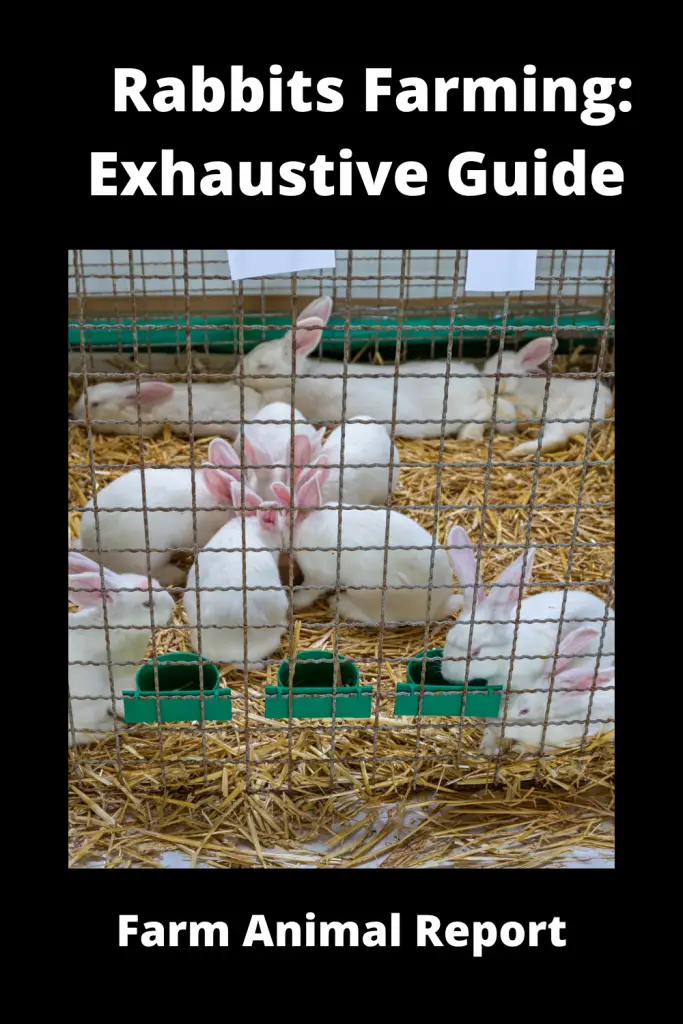
Commercial Farm Requirements
If you want to start a business on a commercial scale, you’ll need the following items to get things started:
- To house at least 100 rabbits, a substantially larger area is required. To begin breeding rabbits on a commercial scale, you must have a minimum of 100 rabbits.
- You should have more area to accommodate newborn kittens.
- You should have a more structured set up to give ample space for the rabbits to live, feed, and play comfortably. You must feed them with the nutrients they require to grow and proliferate.
- You can make use of machinery to control pests and clean up after yourself on the farm.
- To ensure that the bunnies’ living conditions are as comfortable as possible, ventilation is required.
- In order to maintain the Rabbit’s health, bulk containers and food for the rabbits’ consumption are required.
- Enough water should be available for the rabbits to be able to support themselves daily.
- Purchase medication in bulk for the rabbit farms that are used for commercial purposes.
Is rabbit Farming Profitable? Or How do Rabbit Farmers make Money?
Rabbit farming is a very profitable business. The scope of rabbit farming is in the following aspects:
- Rabbit meat is well-known for having high nutritional content. 2. You can sell your rabbits in nations where there are no restrictions on the consumption of rabbit meat, which includes the United States.
- The rabbit wool is widely used in the apparel sector. Rabbit fur may be sold to the wool business at a very profitable price if you know where to look.
- In addition, selling healthy kittens to those interested in starting a rabbit farming business might be a profitable venture.
- The pet sector can provide you with a lucrative business opportunity. A profitable business can be built on the sale of healthy rabbits to pet stores.
- Rabbit manure is a high-quality fertilizer that gardeners and landscaping companies often utilize.
Are Rabbits Easy to Farm?
The Rabbit is one of the easiest animals to raise or incorporate into a small farm. Rabbit breeders have the option of harvesting wool, meat, fertilizer, and pelts from the same animal if they so choose. Even if you are not personally interested in eating meat or slaughtering animals, rabbits can have long and fruitful lives on your farm if they are given the proper care.
How Long Does a Rabbit take to Mature?
When it comes to sexual maturity, medium- to large-sized rabbit breeds reach sexual maturity at 4 to 4.5 months, gigantic breeds at 6 to 9 months, and small breeds (including the Polish Dwarf and Dutch) at 3.5 to 4 months. Female rabbits release their eggs as a result of sexual contact rather than as a result of a hormonal cycle, as is the case in humans. Rabbit’s mating receptivity; on average, rabbits are receptive to mating for 14 out of every 16 days. When a doe’s vagina is red and moist, she is at her most receptive. That is, the does’ vaginal color is white or pale pink, and there is little or no dampness present in the vaginal fluid. A vet-doc may be able to feel fetuses in the belly of a pregnant doe 12 days following the breeding season. The occurrence of false pregnancy in rabbits, in which the Rabbit exhibits indications of pregnancy while not actually being pregnant, is prevalent.
The average pregnancy lasts between 31 and 33 days. According to the research, those who have a small litter (often four or fewer kits) had lengthier pregnancies than does who have larger litters. Alternatively, if a doe has not given birth by day 32 of her pregnancy, your veterinarian may decide to induce labor; otherwise, a dead litter may be born sometime after day 34 of the pregnancy. Pregnant women may abort or reabsorb their fetuses on occasion due to nutritional deficits or sickness.
How many Rabbits Should I Start with?
Two fully grown female rabbits and one fully grown male Rabbit are an excellent starting point to start rabbit farming. When you start with two females and one male Rabbit, you will have as many as 40 to 50 young rabbits per year if you have two females and one male Rabbit. Later, if you discover that you would be able to eat or sell more rabbits if you had more, you might begin raising more rabbits.
Is it Reasonable to Rear Rabbit?
Yes, it is good to rear rabbits because they are cute, make excellent pets, and their farming is very profitable.
Advantages of Rearing Rabbits
- A thriving enterprise.
- They are deafeningly quiet.
- They are excellent compost producers.
- Have a rapid pace of growth.
- They are a low-cost crop to grow.
- They consume a diverse range of plant foods.
- There will be less labor and money involved as a result of this.
- There are no religious prohibitions against eating rabbit meat.
- The species is highly prolific, producing huge litters with a short gestation time.
- Produces very nutritious meat that is minimal in fat and cholesterol and is easily digestible by people of all ages and physical abilities.
Is Rabbit Farming a Good Business?
Rabbit farming is not only profitable, but it is also delightful. A rabbit can be raised as a pet and raised on a small plot of land with little cost. Long before the establishment of the European Union, rabbits were raised in our country.
Commercial rabbit farming has several advantages over other types of farming. Bunnies are cute and small-sized animals that can be found in many habitats. Because they are soft, they make an excellent source of protein. Rabbit meat is in extremely high demand on the market, and there aren’t enough suppliers to meet the demand, which is only expected to increase.
It is a business that requires little capital but generates substantial profits. The demand for fur obtained from Angora rabbits is great in many nations, making it a profitable economic enterprise in many cases. Rabbit meat is also consumed by a tiny population of people worldwide, which can help increase the amount of money made from fur marketing.
How Much Money can you make Selling Rabbits?
If you sell rabbits alive, you may expect to make approximately $10 per bunny on average. When you organize your marketing well (during Easter and fair season), you may sell your live bunnies for anywhere from $20 to $100, depending on the purpose of your stock and its overall quality.
Besides that, you can make money from selling rabbit fur, meat, and manure.
Learn More – 18 Ways to Make Money Rabbit Farming
Final Thoughts: Is Rabbit farming a Profitable Business?
Rabbit farming is a tremendously profitable enterprise. If you have a large plot of land and want to go into the farming business, rabbit farming may be a good choice for you to consider.
Rabbit farming has experienced significant expansion in recent years, owing to a shift in global trends away from traditional cow farming practices. The usage of agricultural goods in the food and textile industries has increased the number of people employed in these industries. When compared to most other cattle farming enterprises, rabbit farming is recognized to create more profits over a more extended period of time.


